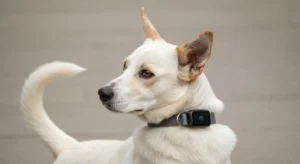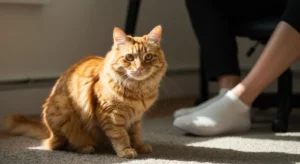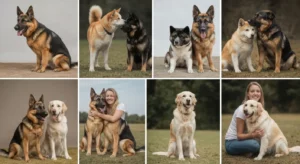Before the fox, the silence of my new home was a weight. I had traded the cacophony of city life—the sirens, the arguments through thin apartment walls, the relentless hum of a million lives lived in parallel—for what I thought would be the restorative quiet of the Virginia mountains. I’d rented a small, stone cottage tucked into a fold of the Blue Ridge, a place where the nearest neighbor was a mile down a gravel road and the forest was not a park, but a presence. It was supposed to be an escape, a self-imposed exile to heal from burnout and coax my writer’s muse out of its long, stubborn hibernation.
For the first month, however, the silence wasn’t peaceful; it was accusatory. It amplified the blankness of the page on my screen and the emptiness in my chest. My days fell into a dull rhythm: wake, coffee, stare at the cursor, walk the perimeter of the small clearing around the cottage, and then retreat back inside, defeated. The forest felt like a wall, dense and inscrutable. I saw it, but I didn’t know how to see it. It was a beautiful, static backdrop to my own inertia. I was lonely, not for people, but for a connection to the world I had so desperately sought.
A Flicker of Flame in the Gloom
The change began on a damp evening in late October. The sun had dissolved behind the western ridge, leaving the sky a bruised purple. A thick mist was rolling up from the hollow, swallowing the trees one by one. I was standing on the covered porch, nursing a lukewarm tea, feeling the familiar melancholy settle in. And then I saw it.
It wasn’t a dramatic entrance. It was just a flicker of movement at the edge of the woods, a flash of color so vibrant it seemed to burn a hole in the twilight gloom. It was the color of autumn leaves, of embers, of sunset. It was a red fox. She stepped cautiously from the cover of the ferns, her body a fluid line of wary elegance. She paused, one forepaw lifted, her head cocked as she tested the air. Her fur was a magnificent russet gold, her legs dipped in black as if she’d waded through shadow, and the tip of her tail was a brilliant, startling white.
I froze, my breath caught in my throat. I was an intruder in her world. We stood there for what felt like an eternity—me on my wooden porch, she on the mossy threshold of her domain. Her eyes, two chips of polished amber, scanned the clearing and then, for a breathtaking second, they met mine. There was no fear in them, only a calm, intelligent assessment. It was a look that said, I see you. And then, as silently as she appeared, she turned and melted back into the woods, leaving me with a racing heart and a profound sense of having witnessed a secret.
That single moment was the first crack in the wall of my solitude. It was the first time my wild fox encounter felt like more than just a random sighting. It felt like an introduction.
The Silent Watcher
After that first night, seeing her became the new focal point of my day. I didn’t give her a name; that felt like an act of possession, an attempt to tame what was magnificently, essentially wild. She was simply “the fox.” Our encounters developed into a quiet ritual, governed by an unspoken set of rules. I learned that she most often appeared in the liminal hours of dawn and dusk, moving with a purpose I could only guess at.
I never left food out. I instinctively knew that to do so would be to shatter the fragile, authentic nature of our connection. It would turn her from a wild creature into a dependent, and it would turn me from a privileged observer into a mere provider. I wanted to witness her life, not alter it. So my offering was my stillness, my silence, my respect.
I would take my coffee to the porch in the pre-dawn chill and wait. Sometimes she wouldn’t show. But on the days she did, it was a gift. I watched her hunt, a masterclass in focus and patience. I saw her pounce on some unseen vole in the tall grass, a perfect, joyful arc of kinetic energy. I watched her groom her magnificent coat, businesslike and thorough. I learned the map of her territory by the paths she favored, the specific log she would leap over, the patch of sunlight where she would sometimes nap.
This daily act of observation began to change me. It forced me out of my own head. My focus shifted from my internal anxieties to her external world. I started noticing the details I’d previously missed—the way the wind rustled a specific branch, the call of a pileated woodpecker, the scent of pine after a rain shower. My senses, dulled by city living and self-absorption, were slowly reawakening. The fox was my guide, teaching me a new language of perception. The silence of the forest was no longer empty; it was filled with the subtle narrative of her life.
An Offering on the Threshold
Weeks turned into a month, and then two. Winter began to tighten its grip on the mountains. The brilliant foliage fell, leaving a stark architecture of black trunks and bare branches against a grey sky. The fox’s visits became more vital to me, a flash of life and color in the monochrome landscape.
One morning, after a night of fierce winds, I opened my door to find a single, perfect crow feather lying on the doormat. It was glossy black, iridescent with hints of deep blue and purple. There was no other debris on the porch, just this one feather, placed almost perfectly in the center of the mat.
My logical mind told me it was a coincidence. The wind had blown it there. It meant nothing. But the part of me that had been learning to see the world through the fox’s eyes felt something different. I had seen her pass by the porch just an hour earlier at dawn. Had she dropped it? Had she left it?
I knew it was fanciful, a story I was telling myself. But it felt like an acknowledgment, a communication across the species divide. It was an object from her world, left on the threshold of mine. I picked it up, its texture smooth and cool, and I felt a jolt of connection so powerful it almost brought tears to my eyes. I placed the feather in a small jar on my writing desk. It became my talisman, a reminder that the world was full of a quiet magic, if you only paid attention. My writing, for so long stagnant, began to flow. I wasn’t writing *about* the fox, but I was writing *because* of her. She had unlocked something in me not with words, but with her steady, wild presence.
Shelter from the Storm
The most profound moment of my wild fox encounter came during a violent winter storm. The forecast had warned of freezing rain and gale-force winds, and it delivered. The power went out early in the evening, plunging my cottage into a primal darkness lit only by a few candles and the fire I’d built in the hearth.
Outside, the world was chaos. Wind howled like a grieving animal, and ice-laden branches cracked and fell with sounds like gunshots. I found myself worrying about the fox. Where did she go in a storm like this? Did she have a den nearby? Was she safe? It was an absurd thing to worry about; she was a wild animal, far more equipped to handle this than I was.
Sometime after midnight, a brilliant flash of lightning illuminated the entire clearing for a split second, a stark, blue-white photograph. And in that flash, I saw her. She was not in a den, but huddled beneath the thick, sheltering skirt of a giant rhododendron bush that grew near the edge of the porch. She had pressed herself deep into the foliage, her body a tight, shivering ball of red fur, her tail wrapped around her for warmth. She was exposed, yet she was enduring.
I watched for the next hour, my face pressed to the cold windowpane. Every time the lightning flashed, I’d see her there, a small, defiant flicker of life against the rage of the storm. We were just feet apart, separated by a wall of glass and a million years of evolution. We were two living beings, taking shelter from the same storm, sharing a moment of profound vulnerability. I felt no impulse to bring her inside. That would have been a violation. Instead, I simply bore witness to her resilience, and a deep, humbling respect washed over me. She didn’t need my help. She just needed the storm to pass. And in watching her, I found a strange strength in myself.
The Lesson of Letting Go
As winter thawed into a wet, green spring, her visits changed. They became less frequent, more brief. I knew why. Her life was entering a new chapter. One glorious May morning, from a great distance, I saw her at the edge of a sun-dappled meadow. And with her were three tiny, tumbling kits—little bundles of dark fur that wrestled and pounced on each other with clumsy glee. A fierce, protective joy swelled in my chest. Her world had expanded, and her focus was now, rightly, on them.
By mid-summer, I rarely saw her at all. The path she had worn at the edge of my clearing began to fade back into the grass. The porch felt empty in the twilight. I felt a pang of loss, a real and surprising grief. The central character of my quiet life had moved on.
But my sadness was tempered by an immense gratitude. That fox came into my life when I was lost and disconnected, and she led me back. Not to people, but to the world itself. She taught me the art of quiet observation, the power of stillness, and the importance of respecting the wildness in others and in nature. She reminded me that the most meaningful connections are not about possessing or changing something, but about honoring it for exactly what it is.
I never saw her up close again. But I didn’t need to. Her lesson was embedded in me. I finished my book. I learned the names of the trees and the birds. The silence of the forest was no longer a weight, but a symphony. The fox had been my muse, my teacher, my silent companion. And our unforgettable encounter was not about the moment a wild animal came close to me, but about the moment it taught me how to truly see the world that was all around me, all along.












